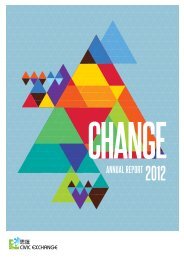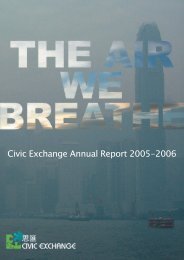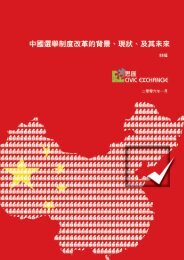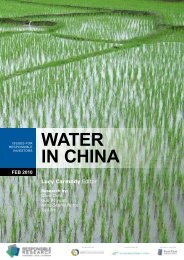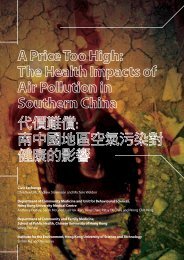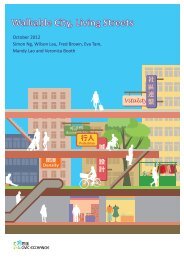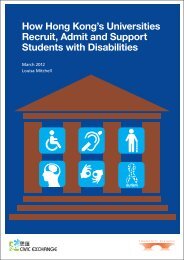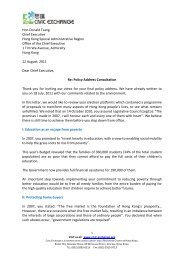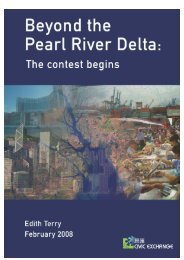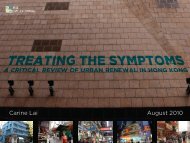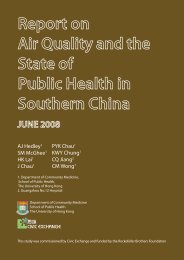Untitled - Civic Exchange
Untitled - Civic Exchange
Untitled - Civic Exchange
You also want an ePaper? Increase the reach of your titles
YUMPU automatically turns print PDFs into web optimized ePapers that Google loves.
THE DYNAMICS OF<br />
DECISION-MAKING IN HONG KONG 7<br />
7.1 Introduction<br />
Decision-makers in the HKSAR government have bought into the rhetoric of sustainable development, but<br />
have yet to put it into practice. Furthermore, they do not appear to recognize Hong Kong's potential to be<br />
a leader in sustainability experimentation, which would give Hong Kong a strategic advantage in economic<br />
growth. 232 On a basic level, decision-makers have failed to identify sustainable development as a policy<br />
objective or to align organizational structures and practices in meeting this goal. Therefore, as a whole, the<br />
decisions and behaviors of government officials do not reflect an attempt to find the most sustainable<br />
solutions.<br />
Hong Kong's current system of decision-making is complex and has its roots in a 19 th century colonial<br />
model of administration where civil servants were trained first and foremost as bureaucratic administrators.<br />
However, implementation of the Chief Executive's new Principal Officials Accountability System (POAS)<br />
on July 1, 2002, will involve fundamental changes in the way that the HKSAR government operates. 233<br />
This move is key in the sense that it is an attempt to reform the executive branch of government. At the<br />
same time, the restructuring of the policy bureaus and the designation of political appointees as effective<br />
ministers are insufficient measures for improving the quality of decisions. While the POAS does provide a<br />
platform for further changes, an overhaul of the decision-making process is also necessary.<br />
The current decision-making process is insufficiently rigorous in assessing alternatives, while the<br />
allocation of resources is often sub-optimal. Indeed, the entire system shows sign of obsolescence. With<br />
rapid changes in expectations and technology, yesterday's strategies are unlikely to prove effective in<br />
solving tomorrow's problems. In developing a sustainable transport system, Hong Kong needs integrated<br />
planning, cross-departmental coordination, and a more effective resource allocation structure so that<br />
related issues can be assessed concurrently before decisions are taken.<br />
Section 7.2 provides some general observations about the current system of decision-making in the<br />
HKSAR government. Section 7.3 discusses those government bodies that play a role in devising and<br />
implementing policies, including elected bodies, and discusses the possible impact of the POAS. Section<br />
7.4 provides several case studies to illustrate observations made in earlier chapters. Section 7.5 provides<br />
recommendations regarding the institutional changes necessary for Hong Kong to move towards greater<br />
sustainability.<br />
7.2 General observations<br />
There are several facts to bear in mind in understanding how the HKSAR government currently makes<br />
decisions with regard to transport and sustainability:<br />
72<br />
232 Gilbert, R. (2002), Electrifying Hong Kong: Making Transport Sustainable, Hong Kong: <strong>Civic</strong> <strong>Exchange</strong> & the<br />
Asia Foundation. Available at .<br />
233 HKSAR Government (2002), Chief Executive announcement, April 14, 2002, available at<br />
.



